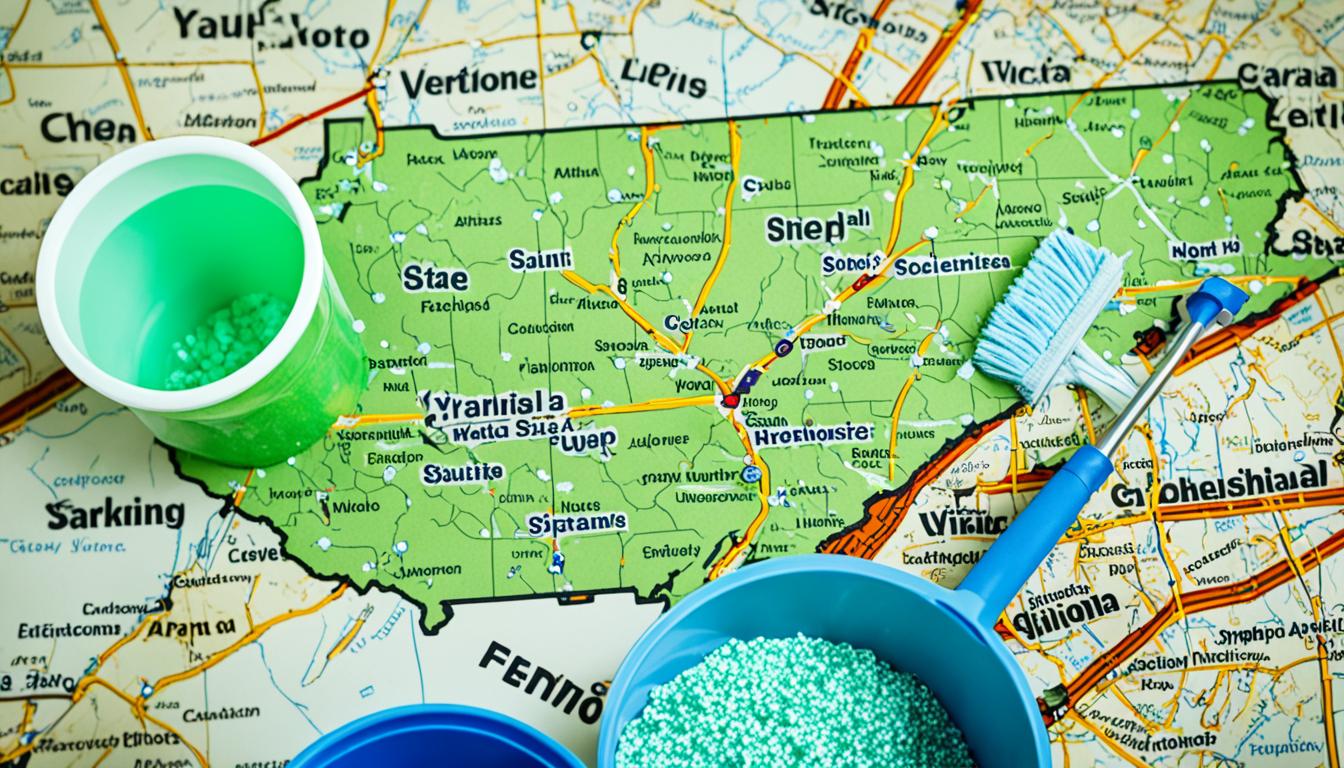Starting a cleaning business in Virginia offers a great opportunity to tap into a strong economy and business-friendly environment. With the right knowledge and strategic planning, you can launch a successful cleaning venture. This guide will cover all the essential steps and requirements, including obtaining the necessary permits, creating a business structure, acquiring the appropriate equipment, developing a solid business plan, implementing an effective marketing strategy, and complying with legal requirements.
Key Takeaways:
- Understand Virginia regulations and legal requirements for starting a cleaning business.
- Create a comprehensive business plan to outline your goals and strategies.
- Invest in the right cleaning equipment and supplies for efficient operations.
- Research and choose the most suitable business structure for your needs.
- Develop a marketing strategy to attract clients and promote your cleaning services.
Choose a Business Structure for your Cleaning Business
When starting a cleaning business in Virginia, it’s crucial to choose the right business structure. Options include sole proprietorship, partnership, corporation, or limited liability company (LLC). Selecting a business structure provides liability protection and determines how your business will be taxed. Each structure has its own advantages and disadvantages, so it’s important to research and understand the implications of each before making a decision.
As a cleaning business owner, you must consider the level of liability protection you need. Operating as a sole proprietorship or partnership exposes your personal assets to potential lawsuits or debts. On the other hand, forming a corporation or LLC ensures that your personal assets are separate from your business liabilities, providing an extra layer of protection.
Here’s an overview of each business structure:
- Sole Proprietorship: This is the simplest and most common business structure. You have complete control over your business, but you are personally liable for all debts and obligations.
- Partnership: If you have a business partner, you can choose a general partnership or a limited partnership. In a general partnership, both partners are equally liable for the obligations of the business. In a limited partnership, there is at least one general partner with unlimited liability and limited partners with limited liability.
- Corporation: A corporation is a separate legal entity from its owners, known as shareholders. It provides the highest level of liability protection but involves more paperwork and formalities. There are two types of corporations: C corporations and S corporations. C corporations are subject to double taxation, while S corporations pass the income and losses through to the shareholders’ personal tax returns.
- Limited Liability Company (LLC): An LLC combines the limited liability of a corporation with the flexibility of a partnership. It provides protection for personal assets while offering simpler management and taxation compared to a corporation.
When choosing a business structure, consider factors such as your growth plans, funding requirements, tax implications, and management preferences. Consulting with a legal professional or business advisor can help you make an informed decision based on your unique circumstances.
Do I need a cleaning license in Virginia?
Generally, you do not need a specific cleaning license in Virginia. However, depending on the services you offer and the location of your business, you may need to obtain a business license or permit. Local regulations and cleaning codes vary, so it’s important to check with the city or county where your business is located to ensure compliance. Understanding the specific requirements will help you operate within the legal framework and provide cleaning services without any issues.
Apply for an EIN (Employer Identification Number) for Virginia
Applying for an Employer Identification Number (EIN) is an important step for your cleaning business in Virginia. An EIN is a unique nine-digit number assigned by the IRS for tax purposes. You will need an EIN if you have employees or if your business is a partnership or corporation.
The application process can be done online through the IRS website. To apply, you will need to provide information such as your legal business name, address, and the name and Social Security number of a principal officer. Obtaining an EIN is crucial for tax identification and compliance.

File/Register your business with Virginia
Once you’ve decided to start a business in Virginia, it’s essential to file and register your business with the State Corporation Commission. This process is necessary to establish your business entity and fulfill the legal requirements of operating in Virginia.
The filing process involves submitting the appropriate documents, depending on the type of business entity you choose. If you’re forming a limited liability company (LLC), you’ll need to file the Articles of Organization. For a corporation, you’ll need to file the Articles of Incorporation.
Submitting these documents is straightforward, but it’s crucial to follow the instructions provided by the state’s online business portal. Adhering to the guidelines will ensure a smooth registration process and prevent any potential delays or complications.
The filing costs for registering your business in Virginia vary depending on the type of business entity you choose. Generally, the filing fee ranges from $100 to $200. It’s recommended to check the State Corporation Commission’s website for the most up-to-date filing costs.
By filing and registering your business with Virginia, you become a recognized legal entity, enabling you to operate your business in compliance with state regulations. It’s an essential step in establishing your presence and ensuring the legitimacy of your business.
Remember, registering your business is just one piece of the puzzle. As you move forward, there are additional steps to take, such as obtaining the necessary licenses and acquiring business insurance to safeguard your operations.
Business License Requirements in Virginia
While starting a cleaning business in Virginia, it is important to familiarize yourself with the local regulations and business license requirements. Virginia does not have a state-wide business license requirement, but each local municipality, city, or county may have its own set of rules and regulations. To ensure that your cleaning business operates legally and avoids any penalties or legal issues, it is crucial to research and comply with the specific business license requirements in your area.
Local jurisdictions may require a business license, general business tax, or other filing requirements. These requirements may vary, so it is essential to check with your local municipality, city, or county office to understand the specific requirements that apply to your cleaning business.
By obtaining the necessary business licenses and meeting the filing requirements, you can ensure that your cleaning business operates within the legal framework and provides services to clients with confidence and professionalism. It is always recommended to consult with local authorities or seek legal advice to ensure full compliance with the applicable regulations.

Key Considerations for Business License Requirements in Virginia:
- Check with your local municipality, city, or county for specific business license requirements.
- Research and comply with local regulations to ensure legal operation of your cleaning business.
- Some jurisdictions may require a business license and general business tax.
- Ensure you meet all the filing requirements to avoid penalties or legal issues.
- Consult with local authorities or seek legal advice for accurate and up-to-date information.
Get Business Insurance
Having proper business insurance is crucial for running a cleaning business in Virginia. It helps protect your business and personal assets in the event of a lawsuit or other legal claim.
When it comes to insurance for your cleaning business, there are several key types to consider:
- General Liability Insurance: This type of insurance provides coverage for third-party bodily injury, property damage, and advertising injuries. It can help protect you if a client slips and falls while you’re cleaning their premises or if you accidentally damage their property.
- Worker’s Compensation Insurance: If you have employees, worker’s compensation insurance is essential. It provides coverage for medical expenses and lost wages if an employee gets injured or becomes ill on the job. It also helps protect your business from being sued by an employee for workplace injuries.
- Commercial Property Insurance: This insurance covers your business property, such as cleaning equipment, supplies, and office space, against damage or loss due to fire, theft, vandalism, or other covered perils. It ensures that you can replace or repair your business assets if they are damaged or destroyed.
By obtaining the right insurance policies, you can have peace of mind knowing that your cleaning business is protected financially in case of accidents, damages, or injuries while providing your services. It also demonstrates professionalism to your clients, increasing their trust in your business.
Remember, insurance requirements may vary depending on your location and the scale of your cleaning business. It’s advisable to consult with an insurance agent or broker who specializes in small businesses to ensure you have the right coverage for your specific needs.
Conclusion
Starting a cleaning business in Virginia requires careful strategic planning and adherence to legal requirements. By following the steps outlined in this guide, including selecting the right business structure, obtaining the necessary licenses, registering your business, obtaining business insurance, and creating a solid marketing strategy, you can set yourself up for success.
Professional services, such as legal advice and assistance from accountants, can be invaluable throughout this process. They can help ensure that you meet all legal obligations and maximize your chances of success. Additionally, staying updated with local regulations and providing high-quality cleaning services will help you build a strong reputation in the industry.
With dedication, hard work, and a focus on delivering exceptional service, your cleaning business can thrive in Virginia’s competitive market. Implementing strategic planning, complying with legal requirements, and investing in the necessary licenses and insurance will give you the foundation you need to achieve long-term success. Good luck!
FAQ
How do I choose a business structure for my cleaning business?
When starting a cleaning business in Virginia, it’s important to choose the right business structure. Options include sole proprietorship, partnership, corporation, or limited liability company (LLC). Selecting a business structure provides liability protection and determines how your business will be taxed. Research and understand the implications of each structure before making a decision.
Do I need a cleaning license in Virginia?
Generally, you do not need a specific cleaning license in Virginia. However, depending on the services you offer and the location of your business, you may need to obtain a business license or permit. Check with the city or county where your business is located to ensure compliance with local regulations and cleaning codes.
How do I apply for an EIN for my cleaning business in Virginia?
Applying for an Employer Identification Number (EIN) is an important step for your cleaning business in Virginia. An EIN is a unique nine-digit number assigned by the IRS for tax purposes. You can apply online through the IRS website by providing information such as your legal business name, address, and the name and Social Security number of a principal officer.
How do I file/register my cleaning business with Virginia?
In Virginia, it is a requirement for all businesses to register with the State Corporation Commission. The filing process involves submitting the necessary documents, such as the Articles of Organization for an LLC or Articles of Incorporation for a corporation. Follow the instructions provided by the state’s online business portal to ensure a smooth registration process and fulfill the legal obligations of operating a business in Virginia.
What are the business license requirements in Virginia?
While Virginia does not have a state-wide business license requirement, it’s important to check with your local municipality, city, or county for any specific business license requirements. Some local jurisdictions may require a business license, general business tax, or other filing requirements. Research and comply with the local regulations to ensure your cleaning business operates legally and avoids any penalties or legal issues.
What type of business insurance do I need for my cleaning business in Virginia?
Having proper business insurance is crucial for running a cleaning business in Virginia. Key insurance types to consider include general liability insurance, worker’s compensation insurance, and commercial property insurance. These coverages provide financial protection in case of accidents, damages, or injuries that may occur during your cleaning services.




